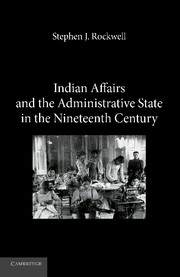Book contents
- Frontmatter
- Contents
- Acknowledgments
- Introduction
- 1 The Myth of Open Wilderness and the Outlines of Big Government
- 2 Managed Expansion in the Early Republic
- 3 Tippecanoe and Treaties, Too: Executive Leadership, Organization, and Effectiveness in the Years of the Factory System
- 4 The Key to Success and the Illusion of Failure
- 5 Big Government Jacksonians
- 6 Tragically Effective: The Administration of Indian Removal
- 7 Public Administration, Politics, and Indian Removal: Perpetuating the Illusion of Failure
- 8 Clearing the Indian Barrier: Indian Affairs at the Center of National Expansion
- 9 Containment and the Weakening of Indian Resistance: The Effectiveness of Reservation Administration
- 10 What's an Administrator To Do? Reservations and Politics
- Conclusion: The Myth of Limited Government
- References
- Index
4 - The Key to Success and the Illusion of Failure
Published online by Cambridge University Press: 06 July 2010
- Frontmatter
- Contents
- Acknowledgments
- Introduction
- 1 The Myth of Open Wilderness and the Outlines of Big Government
- 2 Managed Expansion in the Early Republic
- 3 Tippecanoe and Treaties, Too: Executive Leadership, Organization, and Effectiveness in the Years of the Factory System
- 4 The Key to Success and the Illusion of Failure
- 5 Big Government Jacksonians
- 6 Tragically Effective: The Administration of Indian Removal
- 7 Public Administration, Politics, and Indian Removal: Perpetuating the Illusion of Failure
- 8 Clearing the Indian Barrier: Indian Affairs at the Center of National Expansion
- 9 Containment and the Weakening of Indian Resistance: The Effectiveness of Reservation Administration
- 10 What's an Administrator To Do? Reservations and Politics
- Conclusion: The Myth of Limited Government
- References
- Index
Summary
There are three reasons why it is easy to overlook the effectiveness of public administration in Indian affairs. The first reason is that evaluations of Indian policy and administration in American history have a tendency to focus on the problematic nature of the values and purposes driving government policy. The era's social policies ranged from paternalistic to culturally destructive, and they deserve criticism. Yet administrators often made progress, as they defined it; the era's administrators effectively pursued the goals they set for themselves. And we must remember that “civilization” and other social goals were never the primary purpose of U.S. Indian policy. When evaluations focus exclusively on social policy issues, the effectiveness of agents administering treaties, factories, and economic regulations are obscured. The same is true of focusing on warmaking and military conflict for evidence of state-building and state effectiveness – warmaking, conflict, and extermination were never first goals of the American state. Then, as now, they were rhetorically attractive at times and served in practice as a backup, a deterrent, a last measure. The state's primary goal in the era of the factory system was ordering and managing peaceful and economical continental expansion. Federal agents administering the treaty and factory systems in the early republic accomplished that goal with considerable success.
- Type
- Chapter
- Information
- Publisher: Cambridge University PressPrint publication year: 2010



